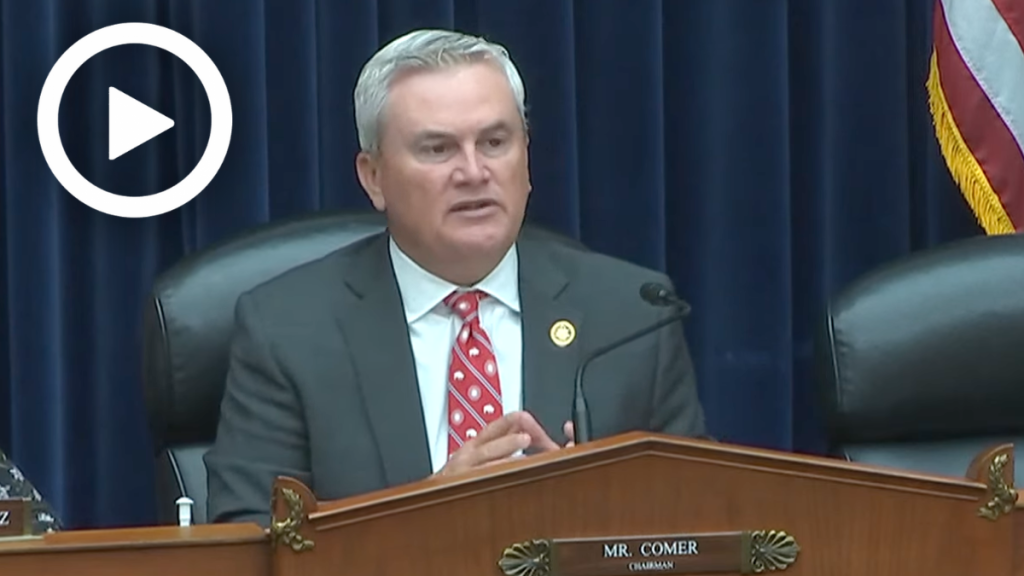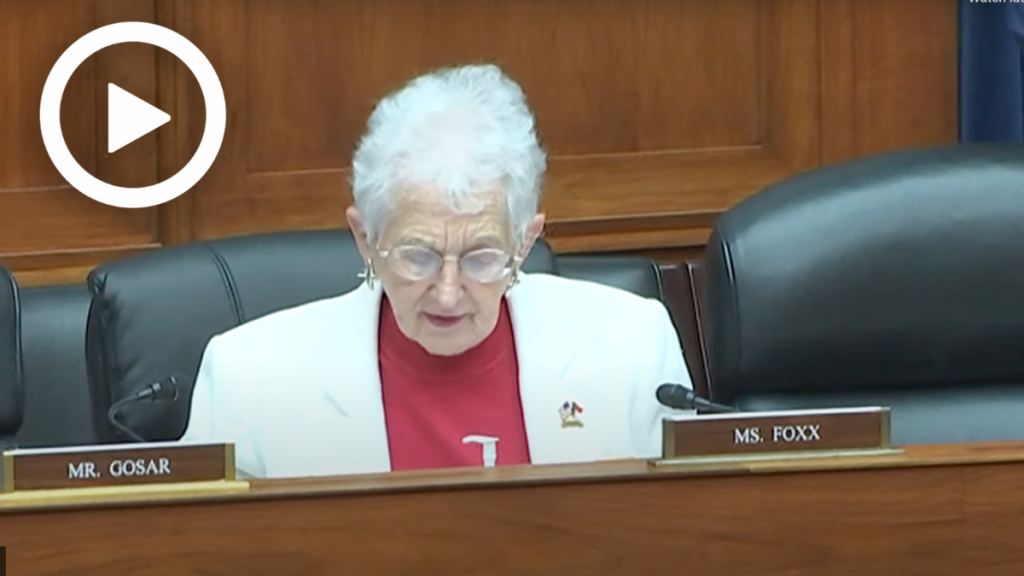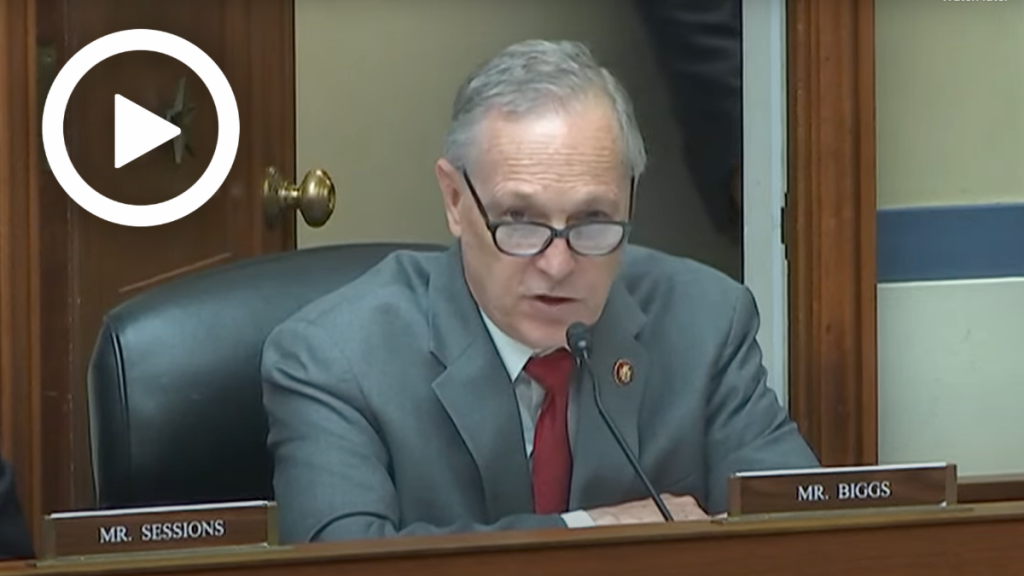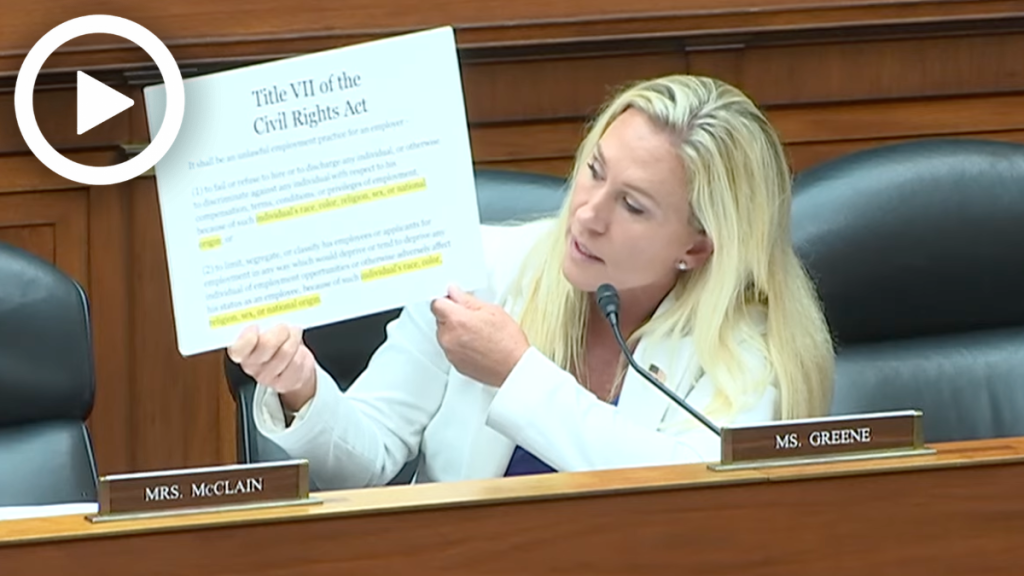Hearing Wrap Up: The Biden Administration’s EEOC is Failing to Hold Companies Accountable for Pushing Unlawful DEI Initiatives
WASHINGTON – The House Committee on Oversight and Accountability held a hearing today titled, “Standing Up for the Rule of Law: Ending Illegal Racial Discrimination and Protecting Men and Women in U.S. Employment Practices.” At the hearing, witnesses testified that U.S. companies are pushing unlawful diversity, equity, and inclusion (DEI) programs and the Equal Employment Opportunity Commission (EEOC) has a responsibility to investigate troubling DEI initiatives that are violating employees’ protected civil rights. Created by Congress, the EEOC has a duty to enforce Title VII of the Civil Rights Act of 1964 against U.S. companies in instances where employment practices illegally discriminate on the basis of race. Further, the EEOC is advancing policies that dismiss its duty to protect women from sexual harassment and discrimination on the basis of sex in the workplace. Members pointed out how under the Biden Administration, the EEOC has failed to protect men and women in the workplace and hold companies accountable for discriminatory DEI practices.
Key Takeaways:
Title VII of the Civil Rights Act of 1964 clearly prohibits unlawful employment practices that discriminate against an individual “because of such individual’s race, color, religion, sex, or national origin.”
- Chairman James Comer (R-Ky.): “Next Tuesday, July 2, we will celebrate the 60th anniversary of the enactment of the Civil Rights Act of 1964 into law. Title VII of that law makes it an unlawful employment practice to discriminate in hiring or against employees once on the job because of their race, color, religion, sex, or national origin. When employers systematically implement employment practices that discriminate on the basis of race, it doesn’t matter that it’s dressed up in a fancy acronym like DEI. The law says that’s illegal racial discrimination.”
Instead of recognizing the plain language of our nation’s civil rights laws, U.S. companies have begun to push unlawful diversity, equity, and inclusion (DEI) policies that favor certain racial categories, encourage discrimination, and are in clear violation of employees’ civil rights.
- Todd Rokita, Attorney General of Indiana: “DEI policies based on an individual’s sex or race are discriminatory because they treat classes of people differently based on a protected characteristic. This is the very practice that Title VII and other civil rights laws, including those at the state level, were enacted to prevent and prohibit. Racial classifications are dangerous because even though they may have compelling goals, using these categories undermines rather than promotes such goals.”
- Jonathan Berry, Managing Partner at Boyden Gray PLLC: “Many corporate DEI programs are unlawful. Reverse discrimination is unlawful discrimination under Title VII. That means that employers cannot take actions with consequences for employees based on their race, even if minorities benefit. To the extent corporate DEI involves employers engaging in recruiting, training, management, and hiring decisions that treat minority employees preferentially on the basis of race, those initiatives are unlawful.”
The Equal Employment Opportunity Commission has failed to adequately enforce Title VII of the Civil Rights Act and investigate companies implementing unlawful DEI practices.
- Chairman James Comer: “Under the Biden Administration, the EEOC has demonstrated a pattern of public activity inconsistent with the law. And when presented with evidence of discriminatory practices at companies, the EEOC appears to have taken no action at all. In the worst cases, EEOC appears to have filed amicus briefs actually defending the ability of companies to engage in racially discriminatory practices.”
- Jonathan Berry, Managing Partner at Boyden Gray PLLC: “The EEOC has a crucial role to play in protecting American workers from discrimination, advancing equal opportunity for all, and ensuring adherence to the law. Unfortunately, in several respects, the EEOC is currently working against those objectives, creating the need for congressional oversight to return the EEOC to its proper function. The EEOC has defended DEI initiatives in the workplace, even when those initiatives create the very Title VII violations that the EEOC is entrusted to stamp out.”
- Inez Feltscher Stepman, Senior Policy and Legal Analyst at Independent Women’s Forum: “The EEOC ignores obvious facial violations of the plain text of the law when not politically convenient, even when companies go so far as to proudly announce their non-compliance. The EEOC has an obligation to enforce Title VII as written by Congress and interpreted by federal courts, not as its bureaucrats wish it to be. That means making it clear that it’s illegal for companies to discriminate on the basis of race in employment decisions, whether the people being discriminated against are white, black, or any other race, and regardless of whether EEOC bureaucrats approve or disapprove of the political rationale behind the discrimination.”
The House Oversight Committee is prepared to examine EEOC’s actions to ensure the Commission is appropriately enforcing the rule of law and protecting all men and women in the workplace.
- Chairman James Comer: “The Equal Employment Opportunity Commission, or EEOC—the federal agency responsible for enforcing federal laws against illegal racial discrimination and harassment in all types of work situations—should stand up for the rule of law and investigate unlawful DEI practices at U.S. companies. The EEOC should also reiterate the plain language of Title VII prohibiting racial discrimination in everything it does: through guidance, public statements, data collection, litigation, or otherwise.”
Member Highlights:
Chairman James Comer highlighted the progress of civil rights in American, recognizing the upcoming 60th anniversary of the passage of the 1964 Civil Rights Act, and how the original drafters of this important legislation would be disappointed in companies implementing hiring quotas and policies that explicitly discriminate on the basis of race.
Chairman Comer: “All one needs to do is review the disclosures of many Fortune 500 companies to witness the implementation of literal racial quotas in hiring and promotion. Can you imagine the disgust of those who crafted the Civil Rights Act to find out that 60 years later some of the largest and wealthiest companies are still not just implementing, but publicly celebrating the racial discrimination at their companies?”
In addition, Chairman Comer asked what the EEOC should be doing at the state level to help identity and address unlawful employment practices.
Chairman Comer: “What could the EEOC be doing for states who are seeking to end unlawful employment practices?”
Mr. Rokita: “I associate with the fellow next to me in his testimony when he said that you’ve got to reign the EEOC back in. They have taken liberties, and that’s to put it charitably, regarding the interpretation on Bostock and other similar cases. Until you get the reforms that the gentleman was talking about done, it’s going to be hard. Or get people who respect the rule of law in there.”
Chairman Comer: “Is the EEOC suing companies over seemingly neutral policies like requiring criminal background checks and appropriate use of enforcement resources in light of more explicit policies based on race at U.S. companies that you have observed in your work?”
Mr. Berry: “That’s one hundred percent correct, Mr. Chairman. The EEOC is going out of its way to develop these disparate impact lawsuits that are really rather intricate, like the Sheetz lawsuit, and ignoring as best we can tell, charges against companies that just right there in big print on their websites say, ‘We are discriminating on the basis of race.’”
Chairman Comer: “What should the EEOC be doing about unlawful company DEI practices based exclusively on race?”
Mr. Berry: “The EEOC should be taking very serious investigatory and litigation action against those companies that are transgressing the core text of Title VII.”
Rep. Virginia Foxx (R-N.C.) analyzed how the EEOC stepped beyond the Supreme Court’s Bostock v. Clayton County decision with its recent enforcement guidance on harassment in the workplace.
Rep. Foxx: “Do you think the EEOC is overstepping its authority and going beyond the Bostock decision with the April 29th guidance?”
Mr. Rokita: “For sure, Chairwoman. Thank you for the question. It’s going way beyond Title VII, which again, Title VII is just about sex, religion, color, terms that are very clear. Now what the Bostock decision did – as I said in my opening remarks – I think they got it wrong, in my humble opinion, but it is the law of the land. They went a little bit further in the hiring and firing decision to include same-sex employees and transgender, but that’s it. These other things that the EEOC has read in act like some kind of wishlist of things that just simply are there.”
Rep. Foxx: “In your testimony, you did note that their guidance runs afoul of the First Amendment and even admits to it. Can you elaborate on that and speak to why the EEOC would knowingly do that?”
Mr. Rokita: “Well, what I do know is that we analyzed federal and Indiana law, clearly we have an official opinion published on this, and there are First Amendment implications to requiring someone to call someone by their preferred pronoun or not. You can’t compel that kind of speech. The EEOC guidance on that is completely wrong.”
Rep. Andy Biggs (R-Ariz.) confirmed that many unlawful DEI practices by corporations violate both state and federal law.
Rep. Biggs: “Race conscious corporate diversity programs may violate Title VII of the Civil Rights Act. Mr. Rokita, in your written testimony, I am quoting from it now, you said ‘DEI programs that consider a job applicant’s race and color in hiring could be considered unlawful under Indiana state law.’ Does that also apply to federal law?”
Mr. Rokita:“Yes.”
Rep. Marjorie Taylor Greene (R-Ga.) stressed the value of Title VII for the American people and discussed examples of unlawful employment practices.
Rep. Greene: “I don’t think anyone stood in line to pick their race, or chose if they wanted to be a man or a woman, or what color hair, or any kind of physical feature before they were born. That’s not something that any of us picked.
“I will say that America has gotten a lot of things right, and Title VII of the Civil Rights Act has done an incredible job with the Black-letter law, and it’s being violated every single day.”
Rep. Greene: “Mr. Rokita, talking about race and having these woke percentage plans, is this a violation [of Title VII]?”
Mr. Rokita: “Assuming the hires are based solely on race, yes.”
Mr. Berry: “Goals are usually quotas under the law.”
Ms. Stepman: “Yes, it’s a violation.”



